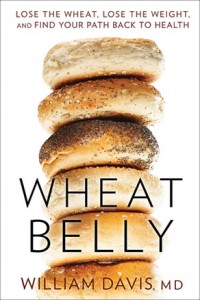 In “Wheat Belly” Dr. William Davis, a preventative cardiologist, helps us to understand the multi-faceted, widespread and far-reaching problems with the so-called “staff of life” that has come to dominate the landscape of American food. He walks the reader through the history of the wheat plant, from its roots as an ancient grain to its current state as a modern, ubiquitous, genetically modified franken-food. He covers the difference between hybridization of many plants, which can result in perfectly healthy foods to eat a la Gregor Mendel and his pea plants (high school biology, anyone?), versus the hybridization habits of wheat which act very differently and may be at the root of many of the problems of modern wheat. Davis also discusses the genetic modification of wheat. Additionally, Dr. Davis explains to us that “the peculiar oversight in the flurry of breeding activity… was that, despite dramatic changed in the genetic makeup of wheat and other crops, no animal or human safety testing was conducted on the new genetic strains that were created.” (p. 25)
In “Wheat Belly” Dr. William Davis, a preventative cardiologist, helps us to understand the multi-faceted, widespread and far-reaching problems with the so-called “staff of life” that has come to dominate the landscape of American food. He walks the reader through the history of the wheat plant, from its roots as an ancient grain to its current state as a modern, ubiquitous, genetically modified franken-food. He covers the difference between hybridization of many plants, which can result in perfectly healthy foods to eat a la Gregor Mendel and his pea plants (high school biology, anyone?), versus the hybridization habits of wheat which act very differently and may be at the root of many of the problems of modern wheat. Davis also discusses the genetic modification of wheat. Additionally, Dr. Davis explains to us that “the peculiar oversight in the flurry of breeding activity… was that, despite dramatic changed in the genetic makeup of wheat and other crops, no animal or human safety testing was conducted on the new genetic strains that were created.” (p. 25)
“Genetic differences generated via thousands of human-engineered hybridizations make for substantial variation in composition, appearance, and quantities important not to just chefs and food processors, but potentially also to human heath.” (p. 30)
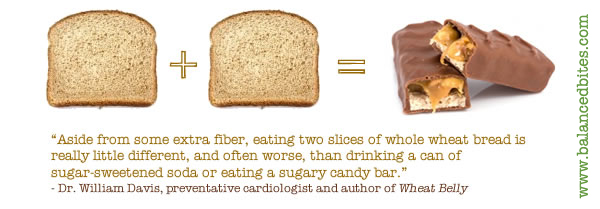
Dr. Davis helps us to clearly understand some of the major differences between the physiological response to wheat as we eat it versus other grains, carbohydrates and even other sugars, for that matter. It's Davis' position that the unique structure of wheat's complex carbohydrate makeup, 75% amylopectin and 25% amylose, is the major contributor to the blood sugar dis-regulation caused uniquely by wheat and wheat-containing products. And while we may eat other complex carbohydrate-rich foods and experience blood sugar spikes, the response to wheat is more severe and more problematic.
“The complex carbohydrate amylopectin is rapidly converted to glucose and absorbed into the bloodstream and, because it is most efficiently digested, is mainly responsible for wheat's blood-sugar-increasing effect… Aside from some extra fiber, eating two slices of whole wheat bread is really little different, and often worse, than drinking a can of sugar-sweetened soda or eating a sugary candy bar.” (p. 32,33)
 While Dr. Davis spends the beginning portion of the book building a case against wheat for its high blood-sugar and diabetes-promoting effects, he goes on to explain how wheat is at the root of nearly all other forms systemic breakdown as well. There is almost a nearly endless list of body systems, tissues and processes that are negatively affected by wheat and Davis details many of them along with how these problems occur. He explains how ill-health resulting from wheat consumption is not all about gluten and details the head-to-toe destruction of health that can ensue upon consumption of this modern marvel of science. He also presents case-studies of various patients who presented with symptoms seemingly unrelated to diet, or so they thought. All of these case-studies provide compelling, first-hand testimony to how life-changing simply removing certain foods from the diet can be.
While Dr. Davis spends the beginning portion of the book building a case against wheat for its high blood-sugar and diabetes-promoting effects, he goes on to explain how wheat is at the root of nearly all other forms systemic breakdown as well. There is almost a nearly endless list of body systems, tissues and processes that are negatively affected by wheat and Davis details many of them along with how these problems occur. He explains how ill-health resulting from wheat consumption is not all about gluten and details the head-to-toe destruction of health that can ensue upon consumption of this modern marvel of science. He also presents case-studies of various patients who presented with symptoms seemingly unrelated to diet, or so they thought. All of these case-studies provide compelling, first-hand testimony to how life-changing simply removing certain foods from the diet can be.
“For some people, wheat is addictive. And, in some people, it is addictive to the point of obsession… Understanding that wheat, specifically exorphins from gluten, have the potential to generate euphoria, addictive behavior, and appetite stimulation means that we have a potential means of weight control: Lose the wheat, lose the weight.” (page. 44)
From schizophrenia, depression and brain fog to cravings and appetite stimulation, it's Davis' proposition that wheat is affecting our brains. Significantly. But perhaps even more significant is the effect that wheat is having on our waistlines. Combine the addictive properties in the exorphins in wheat with the carbohydrates and fat (food-reward, anyone) in refined and processed foods and you have a perfect storm for obesity.
“From the perspective of the seller of food products, wheat is a perfect processed food ingredient: The more you eat, the more you want.” (p. 60)
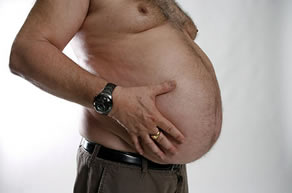
Pregnant man? Nope, it's a wheat belly.
And while we're upset about the way that we look with a “Wheat Belly,” the real problems are metabolic and systemic since the fat we gain in response to this “heart-healthy food” largely accumulates around our organs.
“Visceral fat filling and encircling the abdomen of the wheat belly sort is a unique, twenty-four-hour-a-day, seven-day-a-week metabolic factory. And what it produces is inflammatory signals and abnormal cytokines, or cell-to-cell hormone signal molecules, such as leptin, resistin and tumor necrosis factor. The more visceral fat present, the greater quantities of abnormals signals released into the bloodstream.” (p. 61)
A full, clear and detailed description of celiac disease is included in “Wheat Belly,” as it's the most extremely diagnosed allergy to wheat that exists. Whether or not you have been diagnosed positively, however, Davis explains that presenting with symptoms of gluten allergies or even slight intolerances are affecting our health. While digestive distress and failure to thrive in children had previously been the most obvious effects of Celiac Disease, the affliction may result in no symptoms at all on a regular, daily basis for many years but may present later in life as neurological impairment, incontinence, dementia or gastrointestinal cancer. Some other conditions that are markedly connected to “latent” celiac disease or, as Davis calls it, immune-mediated gluten intolerance, include dermatitis herpetiformis, liver disease, autoimmune diseases, insulin-dependent diabetes, neurological impairment and nutritional deficiencies.
While all of this sounds like a story out of a science-fiction novel or like some sort of complex conspiracy theory, the reality is that we are playing with fire when we consume wheat products. These foods are marketed to us as healthy, but we've only seen a decline in health since abandoning traditional foods and saturated fats in animal products for the adoption of wheat and other refined grain products. Davis's propositions as to how wheat is negatively impacting our health line up extremely well to many of the principles talked about when adopting a pre-historic, Paleo or primal type of diet that shuns grains all together as any regular part of the diet. By doing so, we can more easily manage insulin and other metabolic hormones in the body, maintain proper pH levels, slow aging, decrease risks of heart disease, keep your brain thinking clearly and your waistline looking attractive.
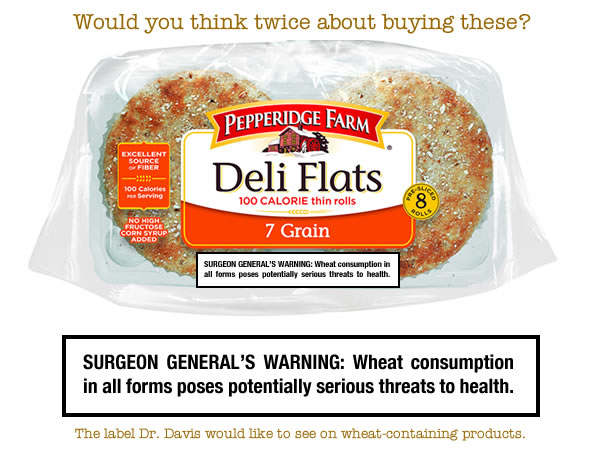
Dr. Davis sets us up witha a 7-Day Wheat-Free meal plan including recipes at the end of the book. There are a few dietary recommendations that I would not agree with, but overall the plan looks mostly like a standard Paleo diet. The items I'd not want someone to include are artificial sweeteners (the doctor recommends Truvia, but I wouldn't touch it with a 10-foot pole) as well as some soy milk (which I don't recommend for estrogenic and antinutrient properties as well as production methods unless it's homemade) and tofu here and there and refers to the tofu as a fermented soy product, but I don't believe that most American tofus are fermented (if they were I'd still say to consume in VERY limited quantities anyway).

“Wheat Belly” author, Dr. William Davis
As much as putting down the bagels sounds difficult (or nearly impossible) at first, it does get easier- especially when a healthier, happier and EASIER life awaits on the other side. If you've been on the fence about whether or not giving up wheat might benefit your health, I highly recommend reading this book. I would also recommend it if you're ever faced with trying to educate someone else as to the powers of this seemingly innocuous food formerly known as the “staff of life.” I propose, and I bet Dr. Davis would agree, that we call wheat what Robb Wolf calls it, Satan's excrement, instead.
You can read more from Dr. Davis on his blog, on Facebook and follow @wheatbelly on Twitter (though to-date he has yet to Tweet). He has also been featured on several popular podcasts recently including The Paleo Solution Podcast and The Underground Wellness Radio Show Podcast.
Click here to view “Wheat Belly” on Amazon.com
Check out “Protein Power Lifeplan” Author Dr. Mike Eades's review of “Wheat Belly” here.

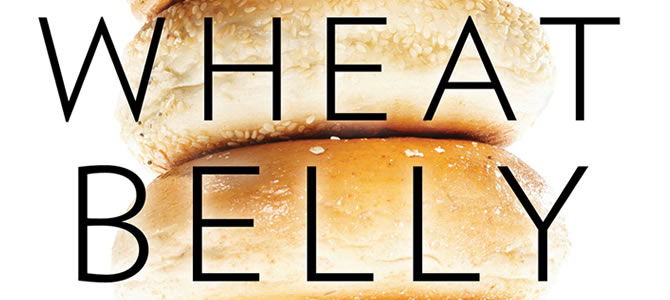
Comments 19
Great review. It’s on my reading list and is probably the next book I will buy. I think it was in the top 10 in sales rank on amazon for a bit. I know I saw it at #15. It’s #27 right now. Awesome!
I’m at Barns and Nobels right now but think I will save $11 and get it on Amazon. I can’t wait for it to arrive!
I am so thrilled that this type of information is getting more and more attention. I sent this to five family members and friends who have been asking me about my primal lifestyle. Thanks for sharing your thoughts on the book!
Well my momma says that gluten is the DEVIL! I’ve been reading this book but then again I’m one of those PALEO NERDS and can totally geek out on this type of study. Thanks for your review.
Hi Diane,
Thanks for your review and especially for your comments on the Wheat Belly debate that seems to be going on around the inter webs. The questions you are asking the Wheat Belly dissenters are exactly what I was wondering when I read their comments. I enjoyed the book, and I think it is a valuable tool for getting people off wheat. I work for a doctor who prescribes paleo to patients so I ordered a couple copies of Wheat Belly for the office, and it has already made a difference in several stubborn patients’ eating habits. If the science in the book is bad, I certainly want to know what and why, so I don’t sound like an idiot! So, thanks again for all you do!
I just finished reading “Wheat Belly” and I wish I could give a copy to everyone I know. I was amazed at the amount of genetic tweaking that has been to modern wheat. It seems so obvious, when you look at the soaring rates of diabetes, obesity and celiac disease, that wheat consumption should be under the microscope as a major problem. But years of the food pyramid have brainwashed everyone into thinking it’s healthy. It’s appalling and discouraging how hard it is to get people to even consider the idea the wheat is unhealthy. Tough to break the bread addiction.
Good review. This book is on my birthday list at number 1 so i’m hoping to be reading it soon. When you use the title “paleo nutritionist” is there a push for that type of licensure? I’m working on a counseling degree (non nutritional), but think a degree in nutrition would also be very beneficial, but i’d rather operate from a paleo/primal base and not other nutrition.
I specialize in paleo nutrition but the title of “nutritionist” is not something I think that’s recognized in the state of California. It is, however, what most folks recognize as a way of identifying what I do. I am a Certified Nutrition Consultant officially speaking. Robb Wolf may be working on some educational materials, but I’m not positive of the status of that.
I wonder if I can make it through an R.D. program with my strong beliefs about HFLC and Paleo! Exactly how I’d like to specialize as well, but short of private practice, I think it would be difficult to make a living.
I just finished Dr. Davis’s book and think it does a great service to get people to wake up to the issues with modern wheat. I know Davis pushes the limits every now and then with some of his statements, but that’s part of the “wake-up” call from him. I know that wheat is not more addictive than heroin, but hearing that phrase a couple of time will make you think twice before picking up a another piece of whole wheat toast.
I’ve been following Davis’s diet plan as outlined in Track Your Plaque for three years and have lost some 45 pounds. It works and is doable, especially when you consider how good you feel when you are wheat free.
You should learn to spell: it’s preventive not preventative!
You mention that he says Stevia is okay, but he also says Sucralose is just as okay. I was really disappointed in that, would love to hear why. Sounds like it is just a concession to help people get their sugar lower, but you don’t need that. Personally, I use Stevia. Its a little plant, grows in my back yard and to me you can’t get better than that.
Yeah, I never agree with an author 100%. That’s just how it goes!
She said “Truvia” not stevia. Although, some say, and I agree, that even stevia is not all that great since it may stimulate appetite.
There is definitely NO WHEAT in my belly and there hasn’t been any in there for 10 years!!
Diagnosed with fibromyalgia. The pain I was suffering was unbearable. Arthritic pain, intestinal pain, inflammatory immune responses, skin blotches,hearing sensitivity, zero energy, aching legs and feet etc. At 46 I had always followed a healthy diet avoiding processed foods and the multitude of drugs my doctor and rheumatologist were prescribing, they were frustraterd with me and most people thought I was crazy not taking drugs, but I was searching for another way, I was desperate as I was getting to the stage that I could no longer exercise, socialize and was cutting my work hours due to incrediable pain. I was always hungry and always eating and always complaining about my pain. I cut out wheat and all gluten grains and my life has turned around so quickly, I am astonished! I can get my life back
I am diagnosed with fibromyalgia, myasthenia gravis, cardio myopathy,
osteoarthritis, diabetes. I have been reading a lot about the Wheat causing these things, I am curious how long it took you to see a change, so you could get off the meds? I am on so much stuff, I spend all day trying to remembering if I took what I am supposed to. My email is
[email protected]
Thank You for your feed back. Sandy
I read this book very quickly because I found it very fascinating. I had never considered that re-engineered wheat could be causing problems, but the book is written quite well and makes a good case. I have given up wheat/starch a few times in my life with great results. This book motivates me to make it a permanent way of life! And I think this is particularly helpful during and beyond middle age.
Dr. Davis is a great gateway to the Paleo lifestyle for people who have a hard time understanding it. Plus Wheat Belly is a great resource for understanding why wheat is SO bad for us, even if we’re not celiac. He’s my dad’s cardiologist and has done wonders for my dad. My dad was skeptical of Paleo until after following Dr. Davis’s plan for a number of years.
Awesome! Its genuinely remarkable article,
I have got much clear idea on the topic of from this post.